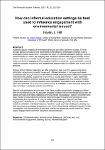How can informal education settings be best used to influence engagement with environmental issues?
| dc.contributor.author | Hill, H.L. | |
| dc.date.accessioned | 2023-12-22T15:37:07Z | |
| dc.date.available | 2023-12-22T15:37:07Z | |
| dc.date.issued | 2023 | |
| dc.identifier.citation |
Hill, H.L. (2023) 'How can informal education settings be best used to influence engagement with environmental issues?', The Plymouth Student Scientist, 16(2), pp. 253-284. | en_US |
| dc.identifier.uri | https://pearl.plymouth.ac.uk/handle/10026.1/21837 | |
| dc.description.abstract |
Increasing global impacts of environmental issues will affect children’s futures. Formal primary school curriculums are insufficient in providing the information children need to understand these issues which increases the need for informal education settings, such as extracurricular eco clubs. By studying how classroom-based clubs engage primary school children with environmental issues through motivations to join, activities undertaken within clubs, and level of engagement they inspire outside the sessions, recommendations can be made to maximise knowledge and engagement opportunities for children both in and out of sessions. Primary school children attending an after school eco club over five weeks were given information about environmental issues with different activities to complete each week. Qualitative data through informal interviews and work produced were collected to determine motivations for joining, reasons for enjoyment of activity and interest in topic, determine potential correlations between activity type and topic engagement, and discover whether independent learning outside sessions was undertaken. Quantitative and qualitative data were also collected via a short anonymous survey to establish overall favourite activity and topic to further investigate potential correlations. Results indicated extracurricular eco clubs have excellent potential for engaging children with environmental issues. All activities engaged children with environmental topics with artbased activities and topics relating to animals proved most popular. Activity enjoyment and topic interest is dependent on personal preference and motivations for joining eco club, emphasising the importance of using a variety of activities and topics to promote engagement. Motivations to undertake self-directed learning outside eco club were also related to children’s individual interests. Teachers could use these findings to develop eco club resources to maximise engagement and inspire long-lasting individual interest. Further investigation into incorporation of activities outside the classroom could determine if these inspire engagement more than classroom-based activities. | en_US |
| dc.language.iso | en | en_US |
| dc.publisher | University of Plymouth | en_US |
| dc.rights | Attribution 3.0 United States | * |
| dc.rights.uri | http://creativecommons.org/licenses/by/3.0/us/ | * |
| dc.subject | Climate education | en_US |
| dc.subject | environmental challenges | en_US |
| dc.subject | childhood | en_US |
| dc.subject | eco club | en_US |
| dc.subject | environmental engagement | en_US |
| dc.subject | learning activity | en_US |
| dc.subject | informal education | en_US |
| dc.title | How can informal education settings be best used to influence engagement with environmental issues? | en_US |
| dc.type | Article | en_US |
| plymouth.issue | 2 | |
| plymouth.volume | 16 | |
| plymouth.journal | The Plymouth Student Scientist |




